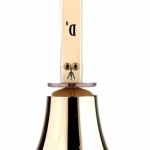I haven’t played in a hand bell choir in many years, but when a Truett student asked me to sub in to the campus bell choir he directs, I had to agree. (I don’t think I was his first choice – maybe his last, but I digress.)
It was assigned bells D5 and E5 and the accidentals on either side. (For you bell ringers you know that’s the bells just above middle C.) Simple, I thought and generally it is. But one thing came back to me in the first rehearsal: every bell is important but only if played at the right time. Many times you’re the only one playing on that particular beat, so notes matter and rhythm matters equally. A bell choir is only as good as its weakest member. And boy I didn’t want that distinction! I was intimidated enough being three times older than these students.
In my quest to be significant there’s no greater lesson than the one offered by the bell choir. If I’m not there, my bell will not ring. If I am there but play at the wrong time, the effect is the same. D and E aren’t really important it seems – unless there’s no one there to ring them at the right time.
I’m still trying to get the right thing at the right time in the rest of my life. I’ve been known to have great ideas but deciding to launch them at the worst time. Or the opposite: timing is right but I say or do the wrong thing.
My new word of admonishment to myself: focus on my present task. Just play my D and E (and/or the accidentals) with gusto, but only at the appropriate time.
I first heard the following story from the great and mighty storyteller, Derric Johnson. It may or may not be true, he says, but it still rings true either way. Here’s his version of the story:
The great Polish pianist Paderewski was giving a concert in one of the world’s great concert halls in the early part of the 20th century. A little boy, a beginning piano student, was taken to the concert by his mother. When the house lights dimmed and the concert was about to begin, the mother discovered that the child was missing from his seat.
Suddenly, the curtains parted and spotlights focused on the impressive Steinway on stage. In horror, the mother saw her little boy sitting at the keyboard, innocently picking out “Chop Sticks.”
At that moment, the great piano master, Paderewski, made his entrance, quickly moved to the piano, and whispered in the boy’s ear, “Don’t quit, son. Keep playing.”
Then, leaning over, Paderewski reached down with his left hand and began filling in a bass part. Soon his right arm reached around to the other side of the child, and added a running obbligato.
Together, the old master and the young student transformed what could have been an embarrassing situation into a wonderfully creative experience.
Sometimes it feels like I’m playing “Chopsticks” over and over. But when the Master comes in and I keep playing my D and E (or Chopsticks), I feel confident that I will eventually hear a masterpiece starting to emerge.
“Let us not become weary in doing good, for at the proper time we will reap a harvest if we do not give up.” Galatians 6:9
Excellent, Nan, as always. I feel the same way about my own ministry. And as a former bell person myself, I identify!
As always Nan, beautiful words and thoughts.
Love this since I almost had to play at the Jam bell choir performance just recently.
I am sure you know how confident I was! Thank goodness 8 year old Nathan Sinclair was there to help me!
Jesus rescued me and both Nathan & I thanked Him so much!